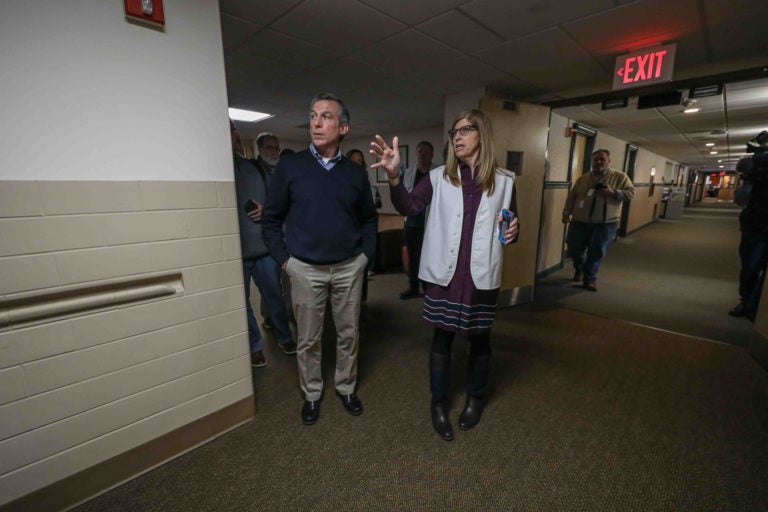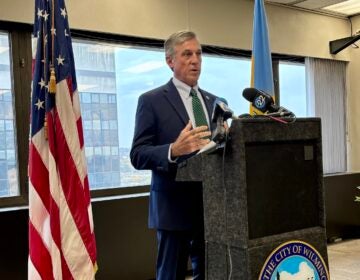To extend states of emergency, Delaware lawmaker wants General Assembly’s approval
A Delaware lawmaker is proposing a bill that would give the General Assembly the authority to approve the renewal of a governor’s state of emergency.

Governor John Carney tours State Health Operations Center with Director of Division of Public Health Dr. Karyl Thomas Rattay on Monday, March 16, 2020, at State Health Operations Center in Smyrna, Del. (Saquan Stimpson for WHYY)
Are you on the front lines of the coronavirus? Help us report on the pandemic.
A Delaware lawmaker is proposing legislation that would give the General Assembly the authority to approve the renewal of a governor’s state of emergency.
State law allows the governor to make such a declaration for up to 30 days to respond to any disaster that poses a threat to the public, and can renew the order if he or she believes it’s in the best interest of the public.
Gov. John Carney issued a State of Emergency on March 12, allowing him to develop a plan to prevent the spread of COVID-19. Since then, the Democrat has renewed his order two times, and has issued 16 modifications to it, ranging from restrictions on businesses, travel and the size of gatherings, to relaxing regulations to allow more health care workers to practice in the state, and to prohibiting landlords from evicting tenants.
New Jersey Gov. Phil Murphy and Pennsylvania Gov. Tom Wolf have also twice renewed their state of emergency declarations to address the pandemic.
Delaware state Rep. Rich Collins said his bill would allow the governor to respond to a disaster quickly, while requiring approval from the General Assembly. And it would also allow for the governor to renew a state of emergency declaration if the situation was so dire legislators were unable to meet, Collins said.
“Any governor needs the ability immediately to respond to an emergency before a group could organize, but 30 days is long enough for that to happen, and then the people’s representatives should be able to speak for them,” said the Republican from Millsboro.
“Right now, the law is being put in place by the governor alone, and affecting more people more profoundly than any in the history of our state — putting people out of business, throwing people out of jobs, closing down churches, closing down other places that people have ownership of as citizens and have the right to visit,” he added. “All of these things he’s doing completely by himself. This is wrong. The people need to have a voice.”
So far, Delaware has 7,223 positive cases of COVID-19 out of 36,957 tests, and 260 people have died from the virus.
The bill is unlikely to gain enough support from the Democratically-controlled state House and Senate. Still, Carney, a Democrat, responded to the proposal during a press conference Wednesday.
While he did not say if he would veto the bill if it did pass, he did say the current law is appropriate, pointing to the “difficult decisions that have to be made to protect the public” during the pandemic and the “timeliness of which those decisions must be made.”
Carney added that decisions are made by a team of leaders in his executive branch, including cabinet secretaries and staff.
“And if I think of the decisions that have had to be made over the last two months, and how…we as a team have had to make them on a day-to-day basis…it’s hard to imagine having a committee hearing on any one of them and coming up with a recommendation to the executive branch from the legislative branch in order to address any of these,” he said.
Carney also said he is in regular meetings with legislative leaders to inform them of his decisions and solicit their input. He said that communication is vital, “but ultimately, it’s the governor that has to make a decision on a situation like this.”
Delaware’s legislative session was postponed to prevent the spread of COVID-19. However, the General Assembly announced Thursday it will return to work virtually on May 26. Collins said if his legislation is not voted on this session, which ends on June 30, he will reintroduce it in January.
WHYY is your source for fact-based, in-depth journalism and information. As a nonprofit organization, we rely on financial support from readers like you. Please give today.




![CoronavirusPandemic_1024x512[1]](https://whyy.org/wp-content/uploads/2020/03/CoronavirusPandemic_1024x5121-300x150.jpg)


